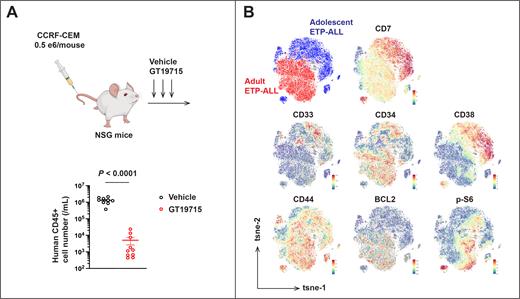T-cell acute lymphoblastic leukemia (T-ALL) is an aggressive hematological malignancy characterized by diffuse infiltration of the bone marrow by immature lymphoblasts of thymic origin expressing T-cell surface markers. Early T cell precursor (ETP)-ALL is a distinct subtype of T-ALL characterized by a lack of CD1a and CD8; low expression of CD5 and the presence of myeloid or stem cell markers, and recent studies have shown resistance to conventional chemotherapies and poor outcome in ETP-ALL compared to thymic or mature T-ALL. A recent study revealed distinct gene expression profiles in adult compared to pediatric-adolescent ETP-ALL, representing higher expression levels of BCL2 and CD34 (Dai et al. Proc Natl Acad Sci 2022), however, detailed proteomic profiling in ETA-ALL has yet to be determined.
Amplification of overexpression of MYC oncogene or stabilization of c-MYC protein occurs up to 70% in human cancers. Multifaceted activities of MYC include rapid proliferation of malignant cells supported by increased mitochondrial and ribosome biogenesis, dysregulated protein translation, and altered metabolism. NOTCH1-MYC signaling axis activation is one of the hallmarks that drives T-ALL leukemogenesis (Weng et al, Science 2004; Sanchez-Martin and Ferrando, Blood 2017). We have reported that targeting of BRD4 proteins induces suppression of leukemia initiating cells (LICs) in T-ALL by inhibiting the NOTCH1-MYC-CD44 axis, providing rationale to target MYC in therapy-resistant T-ALL (Piya et al. Leukemia 2022). We recently reported targeted protein degradation of c-MYC utilizing GT19715, the first-in-class cereblon modulator (CELMoD) for c-MYC exhibited promising anti-leukemia efficacy in acute myeloid leukemias (Nishida et al. ASH 2022). Here we employ GT19715 to investigate efficacy of targeting protein degradation of c-MYC in T-ALL.
GT19715 induced dose-dependent apoptosis and cytoreduction in T-ALL cell lines with IC50 values below 10 nM except HPB-ALL cells. We found substantial decrease of c-MYC protein levels in sensitive but not in resistant cells (HPB-ALL). GT19715 induced apoptosis and ³ 90% cytoreduction at nanomolar concentrations in primary, therapy-resistant T-ALL. GT19715 also enhanced cell death induced by dexamethasone. In a xenograft model of CCRF-CEM cells carrying NOTCH1, PTEN, FBXW7, KRAS and TP53 mutations, GT19715 (3 mg/kg, three IP injections per week, two weeks on and one week off) reduced > 99% circulating human CD45+ leukemia cells compared to vehicle on day 16 after engraftment ( Fig. A), suggesting promising anti-leukemia efficacy in T-ALL in vivo.
ETP-ALL cells from an adult patient exhibited distinct clustering compared to those from an adolescent patient as determined by single-cell mass cytometry (CyTOF) (N = 2). Adult ETP-ALL cells were characterized by increased protein levels of BCL2, CD34, CD44 and p-S6 compared to adolescent ETP-ALL cells, suggesting more stem-like properties. On the other hand, adolescent ETP-ALL cells showed higher CD7, CD33 and CD38 levels compared to the adult sample ( Fig. B). Interestingly, GT19715 treatment predominantly reduced p-S6 high clusters in adult ETP-ALL cells, potentially suggesting c-MYC degradation-induced suppression of the AKT-mTOR pathway.
Conclusion: Targeted protein degradation of c-MYC induces promising anti-leukemia efficacy in T-ALL cells in vitro and in vivo. Further mechanistic and in vivo studies are ongoing.
Disclosures
Chen:Kintor Pharmaceutical: Current Employment. Tong:Kintor Pharmaceutical Ltd: Current Employment, Current equity holder in publicly-traded company. Ren:Kintor Pharmaceutical Ltd: Current Employment, Current equity holder in publicly-traded company. Andreeff:Kintor Pharmaceutical: Research Funding; PMV: Research Funding. Nishida:Kintor Pharmaceutical: Research Funding.


This feature is available to Subscribers Only
Sign In or Create an Account Close Modal